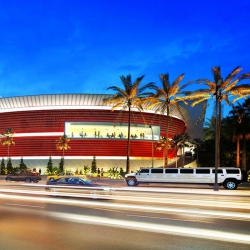The Lucky Dragon casino faces a foreclosure auction, which is scheduled for early next month. The Lucky Dragon opened only 13 months ago just off the Las Vegas Strip, near the Stratosphere.
Lucky Dragon announced last week it would close its casino floor for “six months”, then reopen with more gaming tables and slot machines. The casino was Las Vegas’s first attempt to appeal mainly to an Asian and Asian-American gaming demographic, as the casino housed baccarat tables and Asian themes.
The boutique casino opened in December 2016 with Chinese restaurants and architecture inspired by Feng Shui. Its opening came during a time that baccarat revenues are declining in Las Vegas, so the casino struggled almost from the beginning.
Lucky Dragon Closed Gaming Space
In early January, ownership announced it would close the gaming space and most of the restuarants, though the 203-room casino and a retail shops remain open. At the time of the announcement, Lucky Dragon’s owners stated, “Effective immediately: Lucky Dragon Hotel & Casino is beginning the process of repositioning and, in doing so, will have a reduction in staff while it temporarily closes all gaming and restaurant operations.”
Lucky Dragon’s owners still owe $50 million on the loan they used to open the casino. One reason for the Lucky Dragon’s issues is it’s a standalone business. Most Las Vegas casinos are owned by publicly-traded corporations that own dozens of casinos across the United States — and sometimes around the globe.
Standalone Boutique Casino’s Troubles
According to the Nevada Gaming Abstract, an industry report recently released, over 75% of Nevada’s gaming revenues across the state comes from 62 casinos which are owned by publicly-traded companies. The list of those companies include Las Vegas Sands Corp., Wynn Resorts, Caesars Entertainment, and MGM Resorts.
Lucky Dragon Casino’s main investor is Andrew Fonfa, founder of Las Vegas-based ASF Realty & Investments. The casino should have a new owner in early February 2018. Andrew Fonfa took out a $90 million loan in the spring of 2016, well after construction began on the development. At the time, Fonfa said the casino was “fully financed.”
No Potential Owners Named
Clark County court records show that Lucky Dragon defaulted on the loan in September 2017. The Las Vegas Review-Journal announced a foreclosure auction would happen in February 2018, but has not named any potential buyers in the foreclosure process.
Another reason for the Lucky Dragon’s troubles is its small gaming space, which is around 27,000 square feet. Most Las Vegas casinos have 5 to 10 times the gaming space of Lucky Dragon, which is located on 2.5 acres along West Sahara Avenue.
Baccarat Gambling Not Enough
The small gaming space was not expected to be a problem, because Lucky Dragon would focus on the gaming tastes of Asian and Asian-American gamblers. Casinos in Macau, Singapore, and Manila prefer baccarat to any other form of gambling.
Asian baccarat players like to watch a few hands at a table before joining in, because they want to find a table with good “flow” — a concept associated with “chi” and Feng Shui. In gambling terms, flow can be associated with a “hot” or “cold” table. While it might sound like pure superstition to a westerner, baccarat gambling was the engine behind the rise of Macau, which at its peak generated 7 times the revenue of Las Vegas each year. Because of the hidden revenues of the junket operators of Macau, that number likely was far larger than 7x the revenues.
Baccarat alone cannot sustain a casino in Las Vegas, so the new ownership will have to install blackjack and roulette tables, along with more slot machines. That was the plan for Andrew Fonfa, but it appears that the foreclosure means Fonfa will not have the chance to impliment a Plan B for Lucky Dragon.

